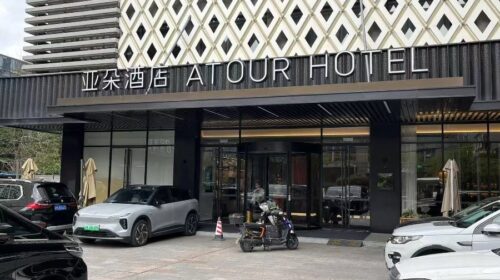Atour gets set for ‘revenge travel’ with major expansion plan

The high-end hotel operator said it plans to have 2,000 hotels in operation by the end of 2025, more than double the 932 at the end of last year
Key Takeaways:
- Atour’s revenue rose just 5% in last year’s fourth quarter due to China’s strict Covid controls, but analysts expect the growth to accelerate to 56% this year
- The retail component of the company’s revenue mix, involving sales of in-room merchandise to guests, posted much faster 34% growth
By Doug Young
Get ready for some “revenge travel.”
That’s the message coming from recently listed hotel operator Atour Lifestyle Holdings Ltd. (ATAT.US), which has announced a major expansion plan with its maiden quarterly earnings report following its U.S. listing last November. The company wants to become a Chinese version of upscale brands like France’s Sofitel and the U.S. Marriott chain, which differentiates it from most of its domestic rivals that focus on the middle- to lower-end of the market.
Atour’s business formula also includes an unusual retail component, generating a sizable chunk of its revenue by selling guests items they see in their rooms during their stays.
Atour’s big expansion plan was contained in its fourth-quarter results released last Thursday, which showed how it suffered alongside its peers at the end of last year as China strongly discouraged travel as part of its strict Covid controls. But now that China has officially scrapped those controls, the company is focused on a future when travel should return to more normal levels, and perhaps rise even higher due to so-called “revenge spending.”
We can look to names like Marriott (MAR.US) for a glimpse of the kind of business bump Atour and its Chinese peers might see later this year, since western brands experienced that kind of boom last year when things returned to more normal levels in the rest of the world. Marriott’s revenue rose 50% last year, and analysts polled by Yahoo Finance expect Atour’s revenue to rise by a similar 56% this year.
The market seems to like Atour’s higher-end focus with the added retailing component. The stock has more than doubled from its IPO price of $11 to its latest close of $26.21, and has a forward price-to-earnings (P/E) ratio of 37. That’s slightly ahead of the 35 for domestic peer H World Group (HTHT.US), which has a middle-range focus, and light years ahead of lower-end focused GreenTree’s (GHG.US) 12. Even Marriott is behind Atour, with a forward P/E of just 21.
Investors didn’t seem too thrilled with Atour’s first post-IPO earnings announcement when it first came out, bidding the shares down 4.2% that day. But the shares gained all of that back and more with an 11% rally last Friday, indicating sentiment was stronger than the initial decline implied.
The company said it was operating 932 hotels at the end of last year, up 25% from a year earlier. But it added it will sharply accelerate the new openings, with plans to more than double the count to around 2,000 hotels by the end of 2025.
The company’s latest report showed it is financing its expansion using its current cash flow and not using its considerable pile of cash and cash equivalents, which stood at 1.6 billion yuan ($233 million) at the end of last year. That’s important for the expansion, as it means the company should be able to open all those new hotels without straining its finances, especially if its cash flow improves with a return to more normal travel patterns.
Focus on hotel management, retail sales
Atour breaks its revenue down into three categories: “manchised hotels,” which means hotels it manages on behalf of third parties; “leased hotels,” referring to hotels it directly owns and manages; and “retail,” which refers to revenue from in-room items sold to its guests. It is focusing on the retail element of its revenue mix, as well as the “manchised hotels,” which carry much higher margins and far lower costs than self-operated hotels.
That shift is on display in its latest report, which shows the company’s overall revenue rose 5.8% in the fourth quarter to 626 million yuan. That’s relatively impressive when one considers domestic travel in China came to a virtual standstill last October and November as a result of the country’s strict Covid control measures.
Within the total, however, the trends were quite different for the three main revenue sources. Revenue from “manchised” hotels rose 5% year-on-year during the quarter, accounting for nearly 60% of the total. Revenue from directly owned and managed properties actually fell 10% year-on-year, accounting for 22% of the total. And revenue from retail sales rose 34%, accounting for 19% of revenue during the quarter.
The company’s revenue per available room (revpar), one of the industry’s most widely watched industry metrics, fell 8% sequentially to 259 yuan in last year’s final quarter, as both occupancy rates and average room rates fell.
In the difficult operating environment, Atour followed a pattern seen in many others in China and looked to control its costs. Those operating costs grew 25% year-on-year during the quarter, though the figure actually fell slightly excluding costs related to share-based compensation. The bottom line was Atour swung to an 83 million yuan net loss for the quarter from a 27 million yuan profit a year earlier. But on an adjusted basis, which excludes stock-based compensation costs, the company remained profitable with a non-GAAP 81 million yuan profit.
We’ll close with some speculation that Atour may take advantage of this positive report to raise some new funds in the not-too-distant future. The company first filed to list back in 2021, at which time it targeted a sizable $350 million in fundraising. But a confluence of factors, including a U.S.-China regulatory dispute and souring sentiment towards U.S.-listed China stocks, forced it to delay the offering for more than a year.
In the end it only raised $50 million as sentiment still remained relatively weak last November when China was still in the midst of trying to stamp out Covid.
The much larger original fundraising target indicates Atour might still like to raise a bit more money, since the shares it sold last November represent a relatively miniscule 3.5% of its current $3.4 billion market cap. Accordingly, we believe the company could take advantage of this latest positive report, combined with the strong performance for its stock so far, to announce new plans for a secondary offering of $200 million to $300 million in new shares in the weeks ahead.
To subscribe to Bamboo Works weekly free newsletter, click here






